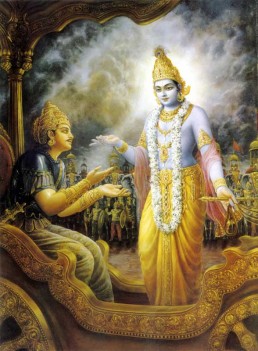Swami Chinmayananda
Swami Chinmayananda Commentary
Suffering from his own delusions as he was, Arjuna, intellectually an average man, had not in himself that amount of subtle philosophical acumen to discriminate between the subtle arguments, and grasp for himself whether the ‘Path-of-Action’ or the ‘Way-of-Knowledge’ was the direct approach to the Infinite, the Eternal. His question concludes, therefore, with a humble request: “Tell me that ‘ONE’ PATH by which, I, for certain, can attain the Highest.”
As a child of that age, there was no doubt, even in Arjuna’s mind, that life was not to be squandered away in merely producing, acquiring, hoarding and spending wealth. As a true child of Hinduism, he vaguely knew that he had to fulfil a great cultural mission in the world, and that material successes were only the means and not the end, or the goal. Partha’s doubt was only on how best he could make use of the environments that presented themselves to him so that he might carve out for himself a greater cultural growth and a fuller spiritual unfoldment in himself.
THE BLESSED LORD GIVES THE FOLLOWING REPLY WHICH IS IN CONFORMITY WITH THE QUESTION:
Adi Sankara Commentary
‘Though the Lord speaks lucidly, still, to me who am of a dull understanding, the Lord’s utterance appears to be conflicting.’ ‘Mohayasi, You bewilder; me, any; buddhim, understanding; iva, as it were; vyamisrena iva, by that seemingly conflicting; vakyena, statement! You have surely undertaken to dispel the confusion of my understanding; but why do You bewildered (it)? Hence I say, “You bewildered my understanding, as it were.”‘ However, if You [In some readings, ‘tvam tu, however, you’, is substituted by ‘tatra, as to that’.-Tr.] think that it is impossible for a single person to pursue both Knowledge and action, which can be undertaken (only) by different persons then, that being the case, vada, tell me; niscitya, for certain; tadekam, one of these, either Knowledge or action: “This indeed is fit for Arjuna, according to his understanding, strength and situation”; yena, by which, by one of either Knowledge or action; aham, I; apnuyam, may attain; sreyah, the highest Good.’ Even if Knowledge had been spoken of at all by the Lord as being subsidiary to steadfastness in action, how then could there be the desire in Arjuna to know of only one of them, as expressed in ‘Tell me one of these two?’ Certainly the Lord did not say, ‘I shall speak of only one among Knowledge and action, but surely not of both’, owing to which, Arjuna, considering it impossible for himself to acquire both, should have prayed for one only! The answer was in accordance witht the question:
The Bhagavad Gita with the commentary of Sri Sankaracharya – Translated by Alladi Mahadeva Sastry
Holy Geeta – Commentary by Swami Chinmayananda
The Bhagavad Gita by Eknath Easwaran – Best selling translation of the Bhagavad Gita
The Bhagavad Gita – Translation and Commentary by Swami Sivananda
Bhagavad Gita – Translation and Commentary by Bhaktivedanta Swami Prabupadha
Srimad Bhagavad Gita Chapter 3 – Verse 2 – 3.2 vyamishreneva vakyena – All Bhagavad Gita (Geeta) Verses in Sanskrit, English, Transliteration, Word Meaning, Translation, Audio, Shankara Bhashya, Adi Sankaracharya Commentary and Links to Videos by Swami Chinmayananda and others – 3-2

